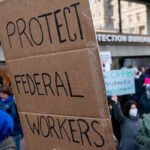by Foysal Atik and Hamimur Rahman Waliullah
The United States has ended Bangladesh’s brief reprieve. Starting Aug 1, all Bangladeshi exports will face an additional 35 percent tariff, bringing average duties to a whopping 50 percent and placing Dhaka under urgent pressure to strike a deal with the Trump administration.
Exporters and economists warn of serious consequences for Bangladesh’s largest export market.
Business leaders and analysts argue that Bangladesh squandered the three-month grace period granted earlier, failing both to reduce the bilateral trade deficit through increased US imports and to negotiate a deal.
Now, they say, the government must make aggressive use of the remaining diplomatic window left open by US President Donald Trump to avert more damage.
The fallout could go beyond the US market. Some fear a ripple effect in Europe as well, while the garments industry, which makes up over 85 percent of Bangladesh’s US exports, braces for intense competition from Vietnam, China, India, and Pakistan — countries either already negotiating or finalising deals with the US.
The Bangladesh Garment Manufacturers and Exporters Association (BGMEA) has already sought an appointment with the chief advisor to assist the interim government in handling negotiations.
Business leaders are also proposing the appointment of lobbyists in Washington to accelerate talks and secure concessions.
Meanwhile, a top economist has urged Dhaka to begin preparing medium-term strategies, improving competitiveness, diversifying products and markets, to protect its trade position globally.
Despite the new tariff measures, all doors are not yet closed. Bangladesh’s Commerce Secretary is en route to Washington to join the next round of negotiations with senior US officials, including Trump’s national security advisors and trade representatives.
A new draft proposal from the US Trade Representative’s (USTR) office reportedly keeps the possibility of negotiation open.
A senior official at the Ministry of Commerce confirmed that the USTR has handed over a fresh draft, assigning the South Asia National Security Advisor and Security Advisor to oversee talks with Bangladesh.
On Monday, Trump sent a letter to Chief Advisor Muhammad Yunus, formally declaring the additional duty on all Bangladeshi goods effective Aug 1.
This second round of tariffs, while slightly reduced from the earlier proposed 37 percent, is expected to hit Bangladesh’s export sector hard, particularly ready-made garments, the country’s leading export to the US market.
Industry insiders warn that competing countries such as India and Pakistan have received relatively lighter tariff increases, raising fears that US buyers might shift orders there for cost efficiency. Bangladesh is among 14 countries now targeted by Trump’s latest tariff wave. Yet Vietnam, a key competitor in garments, has already secured a deal with reduced duties, and India is reportedly close to finalising one.
In early April, Trump imposed heavy tariffs on over 100 countries, including Bangladesh. Amid the shock, Yunus sent a letter urging Trump to reconsider and requested a three-month delay to implement the decision — a request that was granted.
Bangladesh then announced duty exemptions for 626 products, fully removing tariffs on 110 of them to facilitate greater US imports and reduce the trade gap.
In his letter to Yunus, the US president emphasised the “very large” trade deficit between the two nations as justification for maintaining the tariff increase.
WHAT BANGLADESH DID IN THREE MONTHS
On Apr 2, Trump’s trade war announcement sent shockwaves worldwide. Though Bangladesh quickly responded with policy adjustments and a public commitment to negotiation, results on the ground were limited.
The National Board of Revenue (NBR) reviewed tariff structures and announced duty cuts on hundreds of US products. Still, this did not translate into any significant increase in US imports over the following three months.
Economist Mustafizur Rahman, distinguished fellow at CPD, explained the gap: “We can’t force the private sector to increase imports. They will import from where it’s beneficial.
“Government imports are limited — some wheat and other goods — but they also have to balance relations with other countries.”
He added, “Bangladesh is not ready to sign an FTA with the US. We reduced tariffs, yes. But if the US says ‘You’ve done it for everyone, not just us,’ we can’t argue. We’re bound by WTO rules.”
Pre







